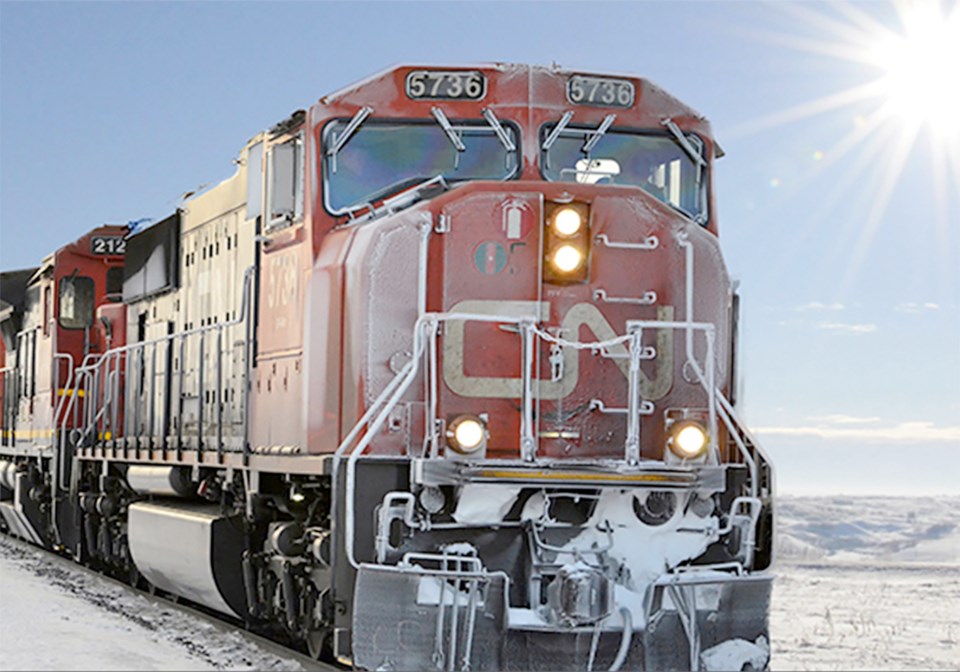SASKATOON — Canada’s two national railways are about to enter a stretch of prolonged labour peace with the major unions representing their workers.
“It’s a period of calm,” said Mark Hemmes, president of Quorum Corp., which is Canada’s grain monitor.
“It’s satisfying to know that at least we’re going to have a couple of years of grace where we don’t have to worry about (work stoppages).”
Canadian National Railway has six collective agreements with its Canadian unionized workforce. All but one of those were recently updated and now expire at the end of 2026 or 2028.
The biggest one is with approximately 6,000 conductors, conductor trainees, yard co-ordinators and locomotive engineers across CN’s Canadian rail network.
The company announced April 7 that it has received the arbitrator’s decision regarding the terms of its new collective agreement with the Teamsters Canada Rail Conference, which represents those employees.
The new three-year pact is effective from Jan. 1, 2024, through Dec. 31, 2026, and includes a three per cent annual wage increase. It does not require ratification.
“We are pleased with the conclusion of the binding arbitration process involving our Canadian conductors and locomotive engineers,” CN spokesperson Ashley Michnowski said in a press release.
“While we remain disappointed that a negotiated settlement was not reached at the bargaining table, we are pleased to be moving forward.”
The company also signed recent deals with the International Brotherhood of Electric Workers (IBEW), which represents 750 signals and communications employees, and Unifor, which represents 1,800 mechanical employees and another 1,500 clerical and intermodal employees.
All three of those deals are four-year pacts that expire Dec. 31, 2028.
CN also has an agreement in place with its 2,500 track forces workers that lasts through Dec. 31, 2026.
The only other agreement is with 150 rail traffic controllers. It expires Dec. 31, 2025.
Canadian Pacific Kansas City has also made huge progress on the labour front.
Since the start of the year, it has announced agreements with three unions representing more than 4,000 employees. They are all four-year pacts.
“In March, the United Steelworkers, representing approximately 600 clerical and intermodal employees in Canada, ratified a new four-year collective agreement,” company spokesperson Terry Cunha said in an email.
“In February, Teamsters Canada Rail Conference Maintenance of Way Employees Division, representing approximately 2,300 engineering service employees in Canada, and Unifor, representing approximately 1,200 mechanical employees, both ratified new four-year collective agreements.”
In August 2024, the Canada Industrial Relations Board ordered binding arbitration to reach new contracts with the Teamsters Rail Canada Conference representing the train and engine division and the rail Canada traffic controller division of CPKC. Those are two separate contracts.
That binding arbitration process has not yet been completed.
“As stated by our chief operating officer, Mark Redd, last week while reporting quarterly earnings, we expect that process to be completed in the coming weeks,” said Cunha.
Hemmes said it sounds like there will be at least a couple of years of labour peace for Canada’s two national railways and likely a third, because it often takes a year of negotiating before talks break down.
That “security blanket” should give traders of agricultural commodities greater confidence to put some business on the books, he said.
Hemmes thinks the railways and unions should use the next couple of years of labour peace to figure “Use this time to have discussions about how you avoid the inevitable storm that’s coming down maybe two or three years from now,” he said.
Perhaps they can develop a modified mediation process that is better than today’s model or come up with some other solution. Those conversations should occur outside of the pressure cooker of bargaining.
“Have those discussions in a less panicked environment,” said Hemmes.
“There has to be a better way than what we’re doing today.”
The U.S. Department of Agriculture reports that the two railways have faced six strikes over the past decade.
Hemmes understands why unions strike. It’s one of the only bargaining chips they have. He also understands why railways can’t give in to all the demands of the unions and sometimes resort to lockouts.
However, he thinks the stoppages need to stop because of the harm they are causing to Canada’s economy and its reputation as a reliable shipper.
“Work stoppages will almost always have a cost that far exceeds any kind of benefit that either one of the parties get,” he said.
Hemmes does not think Canada faces more rail and port strikes than other G20 countries, but disruptions to rail service have a bigger impact because Canada is such an export-dependent nation.
About the author
Related Coverage




